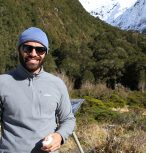DNA reveals the past and future of coral reefs
New DNA techniques are being used to understand how coral reacted to the end of the last ice age in order to better predict how they will cope with current changes to the climate. James Cook Univer

From 2005 to 2022, the main node of the ARC Centre of Excellence for Coral Reef Studies was headquartered at James Cook University in Townsville, Queensland (Australia)








Abstract: The diversity of life has drawn the attention of biologists for centuries. Yet there is still considerable debate about the mechanisms responsible for generating and constraining the distribution of such diversity. The quest for resources poses important limitations to how life can be organised, and because food production and consumption are ultimately physical processes of mass and energy balance, all organisms are constrained by how much energy they need and how much the surrounding environment can provide. Therefore, theories that express resource uptake and allocation on the basis of universal currencies have promising potential to integrate biological phenomena across scales. I will talk about how the energetic expenditure of an individual can effect processes across populations, communities and ecosystems. For that, I use the Metabolic Theory of Ecology (MTE) as an approach, which is grounded on first principles of physics and chemistry. Particularly, I explore how body mass and temperature: (1) determine metabolic and growth rates of individuals; (2) constrain abundances of populations across different trophic categories in conjunction with species richness and area; (3) limit, together with net primary production, biomass and the energy flux of different communities and (4) affect he energy transfer between different trophic levels within an ecosystem. I use fishes as models because they encompass the highest species richness among vertebrates, with > 7 orders of magnitude in body mass, occupying diverse habitats that vary substantially in thermal regime across the globe. In so doing, I discuss insights obtained from this theoretical approach, current limitations, their relevance to coral reef macroecology, climate change biology and future avenues for research.
Bio: Diego Barneche recently completed his PhD in the Quantitative Ecology & Evolution Group at Macquarie University. He is passionate about making better use of mathematical, statistical and computational tools to develop predictive ecological theories, models and empirical tests. He is currently interested in explaining mechanistically how individual-level determinants of metabolism affect the energy flux and productivity of populations, communities and ecosystems across the world’s oceans.
New DNA techniques are being used to understand how coral reacted to the end of the last ice age in order to better predict how they will cope with current changes to the climate. James Cook Univer
A new study on the effects of climate change in five tropical countries has found fisheries are in more trouble than agriculture, and poor people are in the most danger. Distinguished Profess
James Cook University researchers have found brightly coloured fish are becoming increasingly rare as coral declines, with the phenomenon likely to get worse in the future. Christopher Hemingson, a
Researchers working with stakeholders in the Great Barrier Reef region have come up with ideas on how groups responsible for looking after the reef can operate more effectively when the next bleaching
Abstract: As marine species adapt to climate change, their heat tolerance will likely be under strong selection. Individual variation in heat tolerance and its heritability underpin the potential fo
Abstract: The Reef Ecology Lab in KAUST’s Red Sea Research Center explores many aspects of movement ecology of marine organisms, ranging from adult migrations to intergenerational larval dispersal
Abstract: Macroalgal meadows are a prominent, yet often maligned component of the tropical seascape. Our work at Ningaloo reef in WA demonstrate that canopy forming macroalgae provide habitat for ad
Abstract: Sharks are generally perceived as strong and fearsome animals. With fossils dating back at least 420 million years, sharks are not only majestic top predators but they also outlived dinosa
Abstract: Connectivity plays a vital role in many ecosystems through its effects on fundamental ecological and evolutionary processes. Its consequences for populations and metapopulations have been
Abstract: Evolution of many eukaryotic organisms is affected by interactions with microbes. Microbial symbioses can ultimately reflect host’s diet, habitat range, and even body shape. However, how
Abstract: The past few years have seen unprecedented coral bleaching and mortality on the Great Barrier Reef (GBR) but the consequences of this on biodiversity are not yet known. This talk will expl